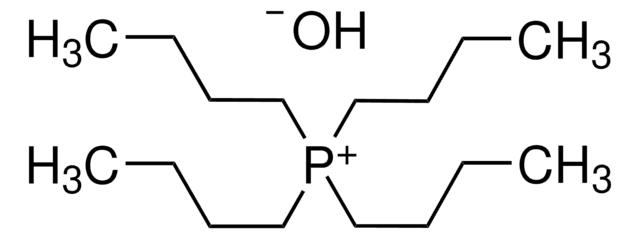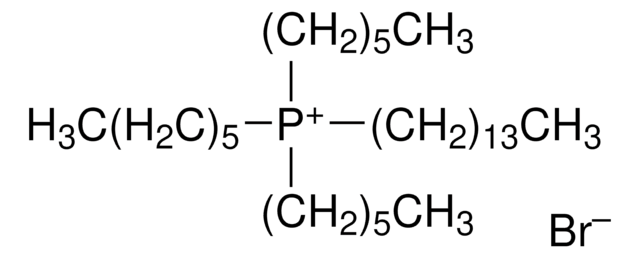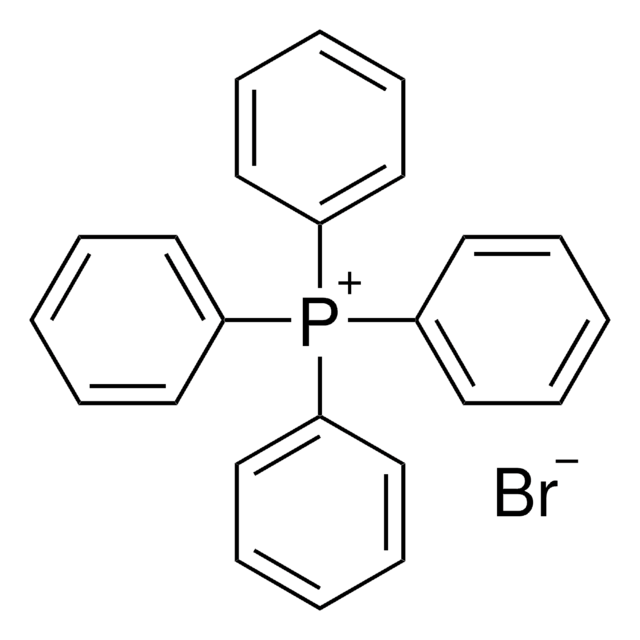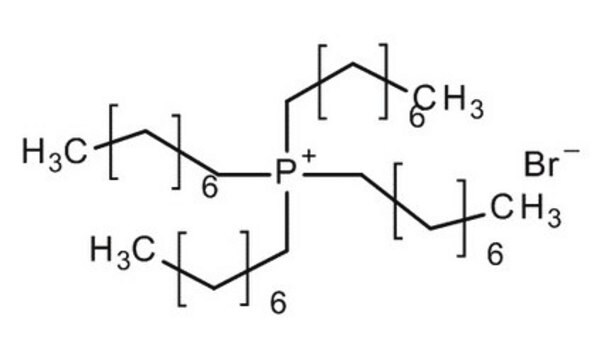189138
Tetrabutylphosphonium bromide
98%
Sinonimo/i:
Tetra-n-butylphosphonium bromide
About This Item
Prodotti consigliati
Saggio
98%
Forma fisica
solid
Caratteristiche più verdi
Catalysis
Learn more about the Principles of Green Chemistry.
sustainability
Greener Alternative Product
Punto di fusione
100-103 °C (lit.)
Categoria alternativa più verde
, Aligned
Stringa SMILE
[Br-].CCCC[P+](CCCC)(CCCC)CCCC
InChI
1S/C16H36P.BrH/c1-5-9-13-17(14-10-6-2,15-11-7-3)16-12-8-4;/h5-16H2,1-4H3;1H/q+1;/p-1
RKHXQBLJXBGEKF-UHFFFAOYSA-M
Cerchi prodotti simili? Visita Guida al confronto tra prodotti
Categorie correlate
Descrizione generale
Applicazioni
- As a medium to disperse ruthenium catalyst for the synthesis of ethylene glycol from synthesis gas via ruthenium melt catalysis.
- As a catalyst supported on silica or alumina for the halogen exchange reaction to synthesize alkyl bromide from alkyl chloride.
- To synthesize various ionic liquids on mixing with different proportions of 1,3-dimethylurea for capturing NO gas.
- As a hydrogen-bond acceptor along with levulinic acid as a hydrogen-bond donor for the preparation of deep eutectic solvents to separate toluene from toluene/n-hexane mixtures.
- To prepare ionic semiclathrate hydrates.
Avvertenze
Danger
Indicazioni di pericolo
Classi di pericolo
Acute Tox. 3 Dermal - Acute Tox. 4 Oral - Aquatic Chronic 2 - Eye Dam. 1 - Met. Corr. 1 - Repr. 2 - Skin Sens. 1B
Codice della classe di stoccaggio
6.1C - Combustible acute toxic Cat.3 / toxic compounds or compounds which causing chronic effects
Classe di pericolosità dell'acqua (WGK)
WGK 1
Punto d’infiammabilità (°F)
554.0 °F - closed cup
Punto d’infiammabilità (°C)
290 °C - closed cup
Dispositivi di protezione individuale
dust mask type N95 (US), Eyeshields, Faceshields, Gloves, type P3 (EN 143) respirator cartridges
Scegli una delle versioni più recenti:
Possiedi già questo prodotto?
I documenti relativi ai prodotti acquistati recentemente sono disponibili nell’Archivio dei documenti.
Il team dei nostri ricercatori vanta grande esperienza in tutte le aree della ricerca quali Life Science, scienza dei materiali, sintesi chimica, cromatografia, discipline analitiche, ecc..
Contatta l'Assistenza Tecnica.












